Overview
Applying for disability in South Carolina can feel overwhelming, but you are not alone in this journey. Understanding the eligibility requirements for programs like Social Security Disability Insurance (SSDI) and Supplemental Security Income (SSI) is crucial. These requirements include:
- Work history
- Medical conditions
- Financial limits
We understand that many applicants face challenges, including a high denial rate. This makes it essential to provide comprehensive medical evidence and to follow the correct procedures. Thorough documentation can make a significant difference in your application process.
Remember, we're here to help you navigate this path. Take the time to understand the application process, as it can be the key to receiving the support you need. You have the strength to overcome these obstacles, and with the right information and preparation, you can improve your chances of success.
Introduction
Navigating the complexities of applying for disability benefits in South Carolina can feel overwhelming. Many individuals face this daunting task, and it's common to feel lost in the process. With millions relying on federal programs like Social Security Disability Insurance (SSDI) and Supplemental Security Income (SSI), understanding eligibility and documentation is essential. Unfortunately, the high denial rates can lead to frustration and confusion. So, how can you ensure your application stands out?
This guide is here to help. We offer a comprehensive step-by-step approach to demystify the application process, empowering you to secure the support you need. Remember, you are not alone in this journey, and we’re here to assist you every step of the way.
Understand the Disability Benefits Landscape in South Carolina
In South Carolina, we understand that navigating how to apply for disability in South Carolina can be overwhelming. Many individuals rely on two key federal programs: Social Security Disability Insurance (SSDI) and Supplemental Security Income (SSI). SSDI is designed for those who have contributed to Social Security through their work history, while SSI offers essential financial support to individuals with limited income and resources, based on need.
As of 2025, approximately 7.4 million individuals receive SSI assistance nationwide, with many residing right here in South Carolina. Understanding the eligibility requirements for each program is crucial, as it directly affects how to apply for disability in South Carolina and the benefits that are available to you. For instance, SSI applicants must meet strict income and asset limits set by the Social Security Administration, while SSDI eligibility relies on the work credits accumulated throughout a person's career.
We encourage you to familiarize yourself with local resources, such as the South Carolina Department of Social Services, which can provide valuable guidance on how to apply for disability in South Carolina throughout your journey. Additionally, insights from experts emphasize the importance of grasping the nuances of these programs to improve your chances of a successful application. It's common to feel disheartened when initial claims are denied, but by utilizing available resources and understanding your needs, you can navigate the complexities of the support system more effectively.
Remember, you are not alone in this journey. We're here to help you every step of the way.
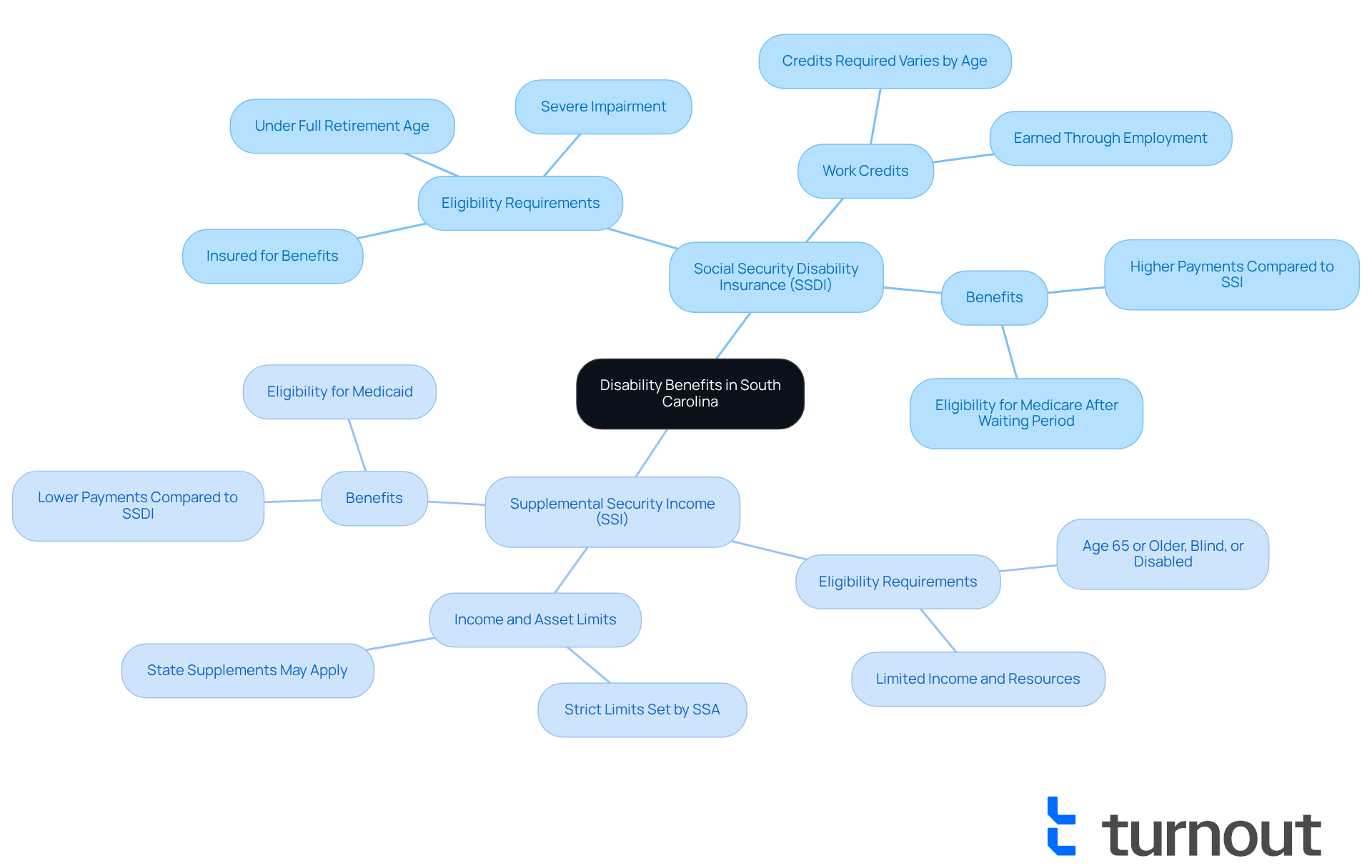
Determine Your Eligibility for Disability Benefits
While figuring out how to apply for disability in South Carolina and determining your eligibility for benefits can feel overwhelming, we’re here to help. Consider the following criteria that may guide you through this process:
- Work History: For SSDI, it’s important to know that you must have worked in jobs covered by Social Security and earned enough work credits. Generally, you need 40 credits, with 20 earned in the last 10 years.
- Medical Condition: Your condition must align with the Social Security Administration's (SSA) definition of disability. This means it should significantly limit your ability to perform basic work activities. It’s common to feel disheartened, as many applicants are denied due to not meeting these medical criteria, so ensuring your condition meets SSA guidelines is crucial.
- Income and Resources: For SSI, your income and resources must fall below specific limits. As of 2025, individuals must have less than $2,000 in assets (or $3,000 for couples). Understanding how your housing conditions and extra income streams influence your eligibility is essential, as these factors can greatly affect your benefits.
- Age and Residency: You must be a resident of South Carolina and usually under 67 years old to qualify for these benefits. Notably, individuals over 65 can qualify based solely on age, provided they meet the financial requirements.
To learn how to apply for disability in South Carolina, examine the SSA's Blue Book, which details the medical conditions that qualify for assistance. Utilizing available resources can deepen your understanding of the process and enhance your likelihood of acceptance. Remember, you are not alone in this journey, and there are people ready to support you.
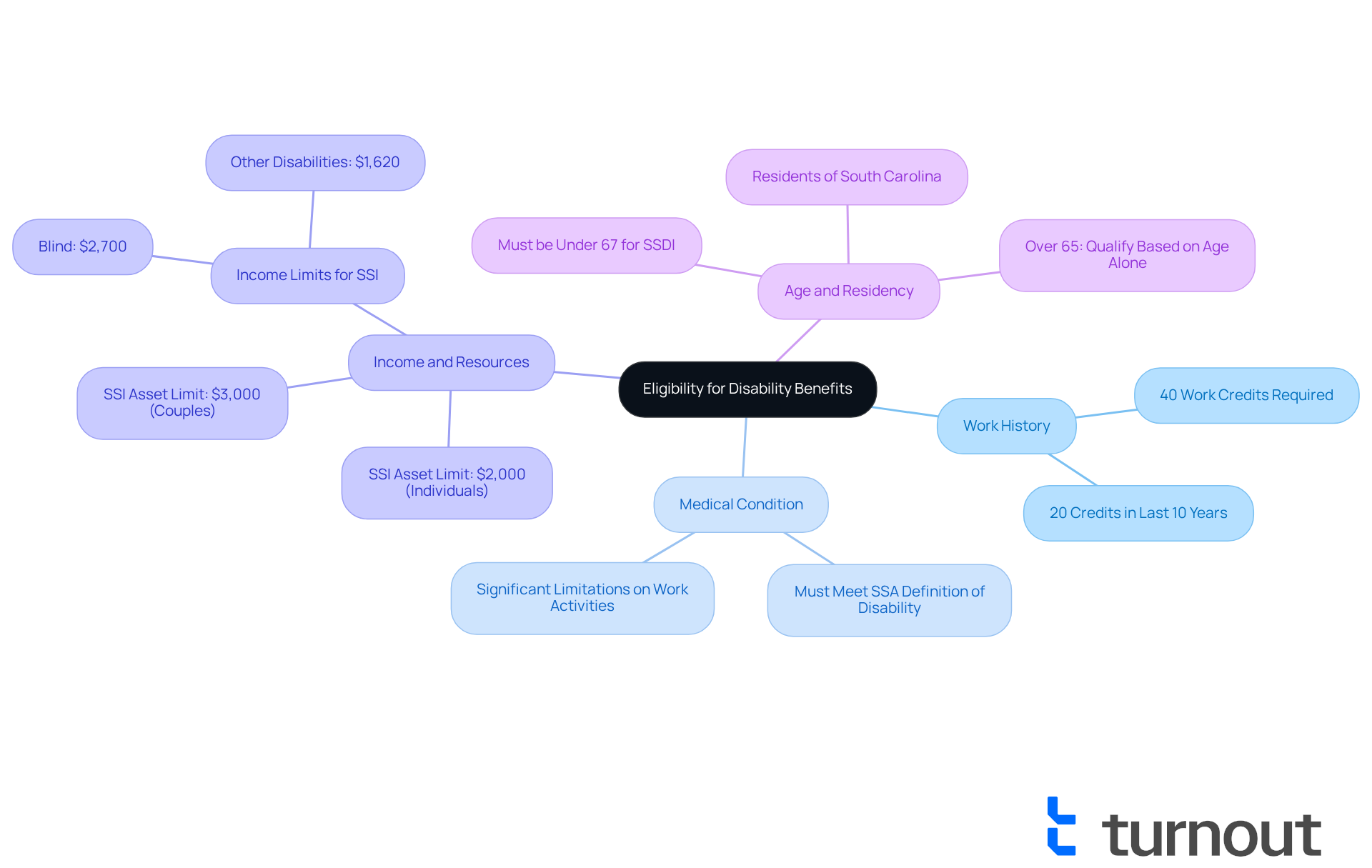
Collect Required Documentation for Your Application
Before understanding how to apply for disability in South Carolina, we recognize that gathering the necessary documents can feel overwhelming. To help you navigate this process, here are the essential documents you’ll need:
- Personal Information: Make sure to include your Social Security number, birth certificate, and contact information.
- Medical Records: It’s important to compile detailed medical documentation from your healthcare providers. This should encompass diagnoses, treatment history, and relevant test results. Comprehensive medical records are vital in demonstrating the severity of your condition and its impact on your daily life. Remember, thorough documentation is key to a successful application.
- Employment History: Prepare a comprehensive work history that includes job titles, dates of employment, and descriptions of job duties. This information helps establish your work background and the impact of your disability on your ability to perform these roles.
- Financial Information: Gather documentation of your income, assets, and any other financial resources, such as bank statements and tax returns. This information is necessary to assess your financial need for benefits.
- Disability Report: Complete the Adult Disability Report (Form SSA-3368), which provides the Social Security Administration (SSA) with detailed information about your condition and its effects on your daily life.
At Turnout, we’re here to assist you through this process with trained nonlawyer advocates who can help you compile these documents effectively. Ensure all documents are precise and current to promote a seamless submission process.
In South Carolina, many applicants face challenges in gathering medical records when figuring out how to apply for disability in South Carolina due to the volume of paperwork required. It’s common to feel lost, but keeping a well-organized file or notebook to track all correspondence and medical documentation can significantly streamline the process. Additionally, maintaining a telephone log to monitor calls made or received concerning your Social Security case can be advantageous.
Statistics show that prevalent medical issues noted in applications for assistance include chronic pain, mental health disorders, and mobility impairments. This emphasizes the necessity for thorough medical evidence to substantiate your claim. Notably, the denial rate for initial claims for benefits related to disabilities in South Carolina is 67.9%, with only 32.1% approved. This highlights the importance of thorough documentation.
Remember, to qualify for Social Security benefits for those unable to work, you must anticipate being unable to perform your job for a minimum of 12 months. At Turnout, we want you to know that you are not alone in this journey. We are not a law firm and are not affiliated with any law firm or government agency; no information on this site constitutes legal advice.
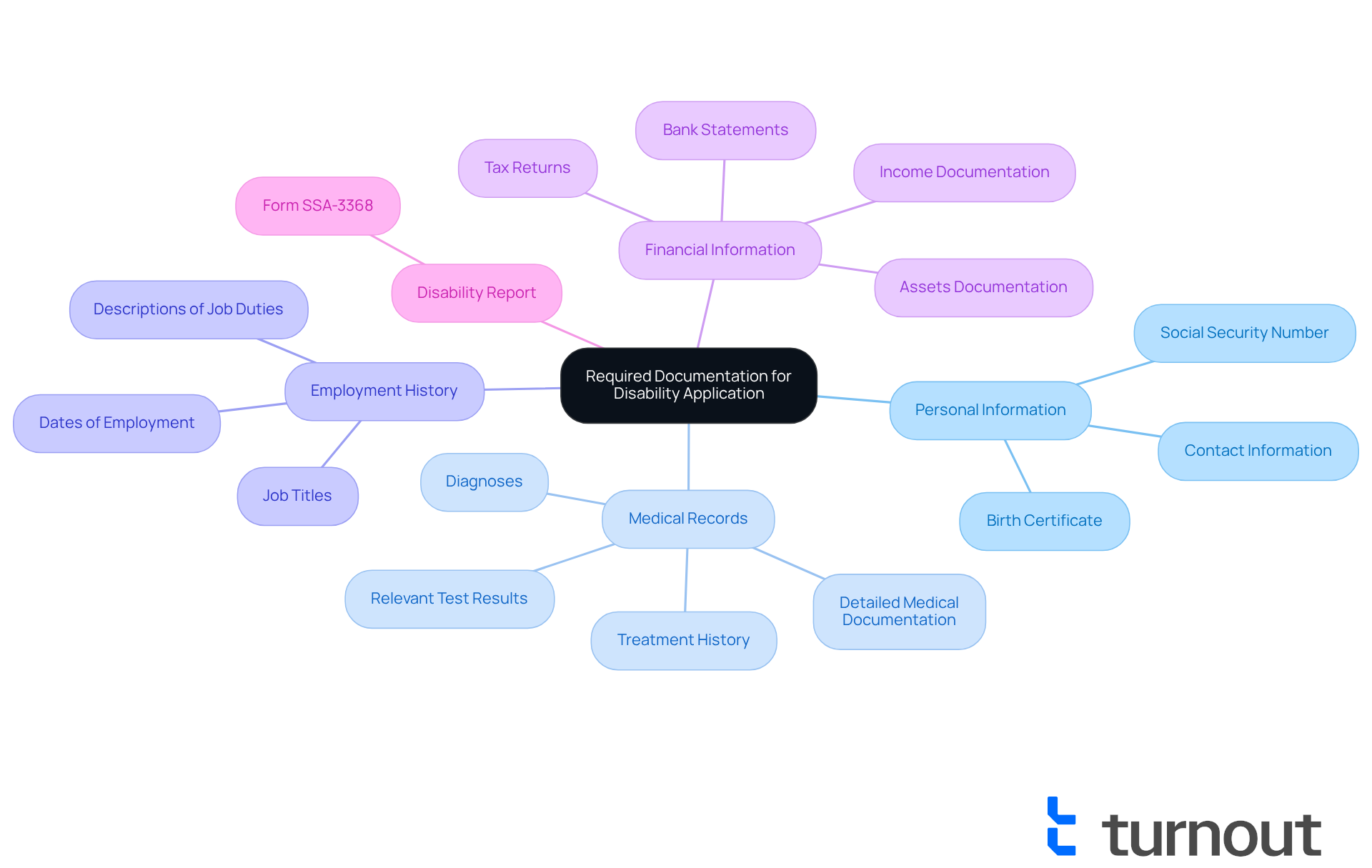
Complete the Disability Application Forms Accurately
When completing your disability application, it's important to know that you are not alone in this journey. Follow these steps to make the process smoother:
-
Choose Your Application Method: You can apply online through the SSA website, by phone at 1-800-772-1213, or in person at your local SSA office. The online platform is especially convenient, allowing you to initiate your claim right away and skip the wait for a meeting.
-
Fill Out the Forms: Complete the primary submission form (Form SSA-16) and the Adult Disability Report (Form SSA-3368). Be thorough and answer all questions completely. Avoid leaving any fields blank, as incomplete forms can lead to significant delays or denials.
-
Provide Detailed Information: Clearly describe your medical condition, how it affects your daily life, and any treatments you have undergone. Include specific examples of how your disability limits your ability to work. Remember, the Social Security Administration emphasizes the importance of detailed medical evidence, so ensure your descriptions are comprehensive. A thorough viewpoint from your treating physician can greatly enhance your submission. If you need assistance, Turnout offers trained nonlawyer advocates who can help you navigate this process effectively.
-
Review Your Application: Before submitting, double-check all information for accuracy. Ensure that all necessary documents are attached and that your submission is signed. Small errors can lead to major setbacks, so take your time to review everything carefully.
-
Submit Your Request: Once everything is complete, submit your request through your chosen method. If applying online, follow the prompts to ensure successful submission. Regularly check the status of your submission to avoid missing important deadlines. The SSA has strict guidelines that must be adhered to, and missing deadlines or neglecting to reply to SSA requests can jeopardize your submission. Remaining organized and proactive is essential, and remember, we're here to help you every step of the way.
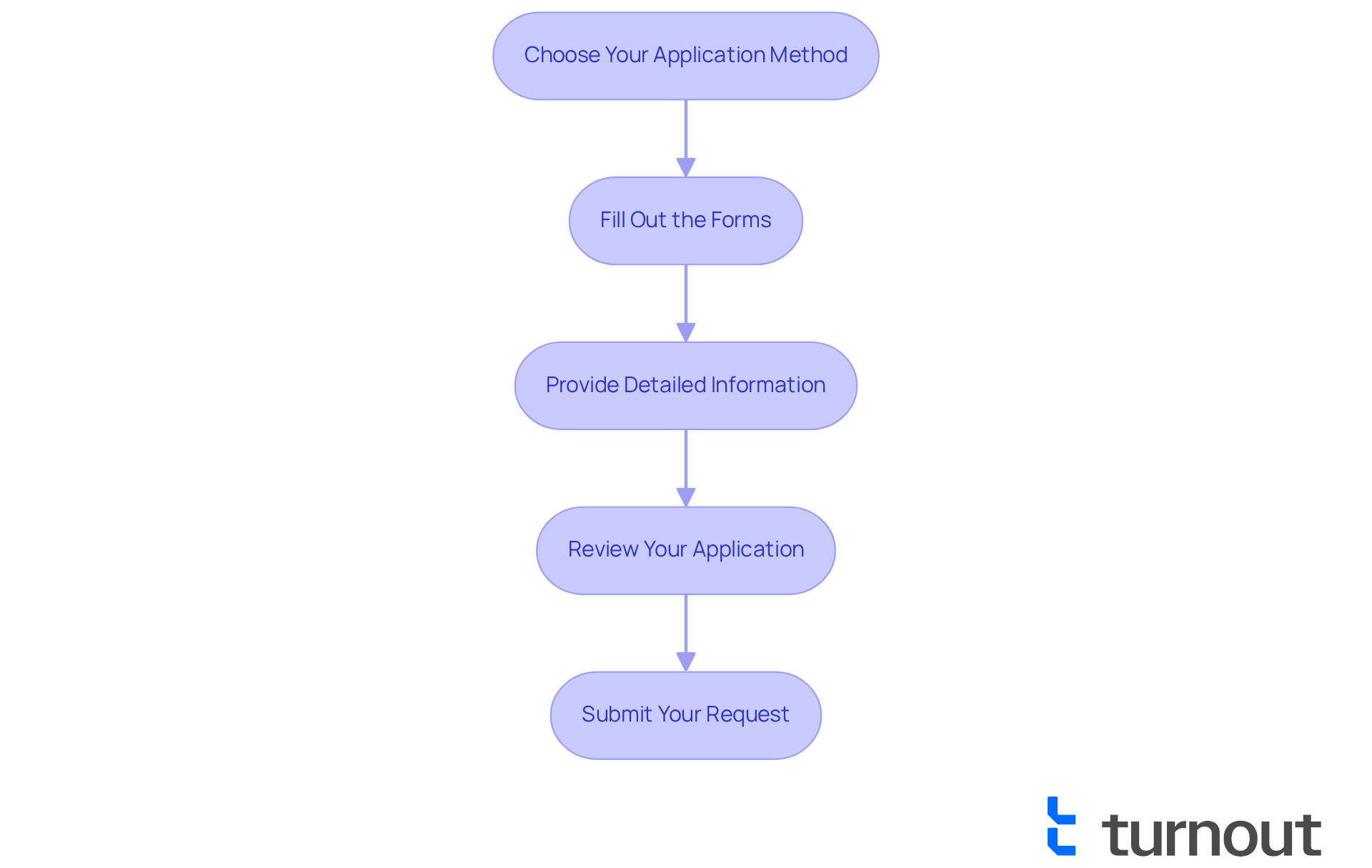
Know What Happens After You Submit Your Application
After submitting your disability application, you may wonder how to apply for disability in South Carolina and what the next steps are. We understand that figuring out how to apply for disability in South Carolina can be a challenging process, and we’re here to guide you through it.
-
Application Review: The SSA will carefully evaluate your submission and documentation to determine if you meet the eligibility criteria. This process can take several months, often ranging from 225 to 231 days (approximately 7 to 7.5 months) as of 2025. It’s common to feel anxious during this waiting period.
-
Decision Notification: Once a decision is made, you will receive a notification regarding the outcome of your submission. If approved, you will receive details about your benefits and when they will begin, typically starting in the sixth month after your disability onset date. If denied, the letter will explain the reasons for denial and your options for appeal. Remember, you are not alone in navigating this.
-
Appeal Process: Should your request be denied, you have the right to contest the decision. You can request a reconsideration within 60 days of receiving the denial letter. The SSA will then review your case again, which may involve additional documentation or hearings. The average processing time for reconsideration appeals is around 7 months. During this time, it’s important to stay proactive in understanding how to apply for disability in South Carolina.
-
Ongoing Communication: Maintaining contact with the SSA is essential. You can verify the status of your request online or via phone. Keeping your contact information updated ensures you receive timely notifications about your case. The SSA encourages applicants to utilize online services to streamline communication and reduce wait times.
If you need assistance during this process, Turnout offers support through trained nonlawyer advocates who can help you navigate the complexities of SSD claims without the need for legal representation. It’s important to note that Turnout is not a law firm and does not provide legal advice. This approach ensures you receive the guidance necessary to effectively manage your application and understand your options. Remember, we’re here to help you every step of the way.
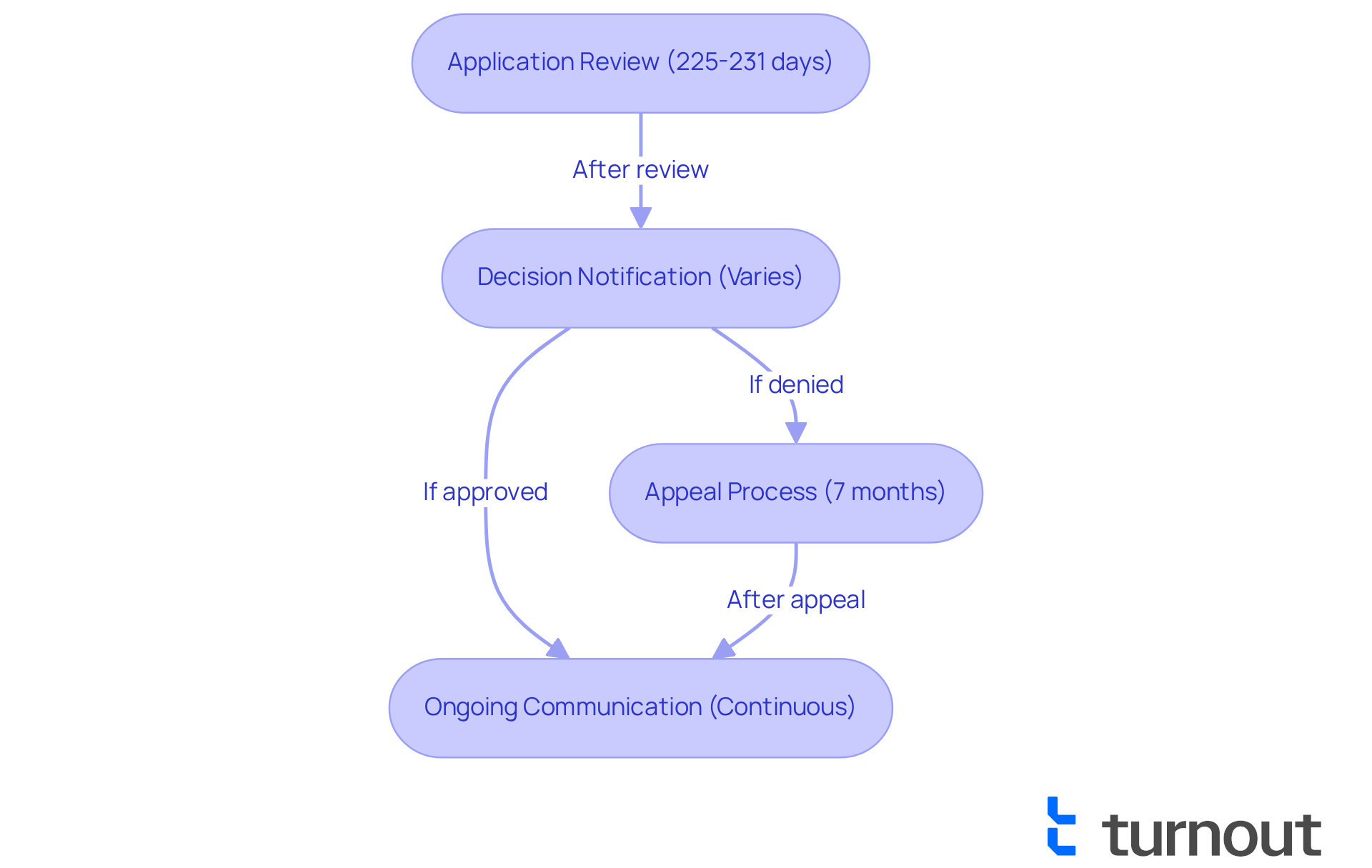
Conclusion
Navigating the process of applying for disability in South Carolina can feel overwhelming. We understand that this journey is filled with challenges, but knowing the steps involved can truly ease the experience. This guide emphasizes the importance of familiarizing yourself with the various programs available, like SSDI and SSI, and highlights the need for thorough documentation and accurate application forms to enhance your chances of approval.
Throughout this article, we’ve shared key insights, including:
- Eligibility requirements for both SSDI and SSI
- Essential documents for a successful application
- The steps to take after submission
It’s common to face hurdles, such as high denial rates and the emotional toll of the application process. Remember, utilizing local resources and seeking assistance from trained advocates can provide invaluable support and guidance.
Ultimately, securing disability benefits is not solely about understanding the technicalities; it’s also about perseverance and advocacy. We encourage you to take proactive steps, stay organized, and maintain open communication with the SSA. By equipping yourself with knowledge and support, you can navigate the disability application process in South Carolina and move closer to the assistance you rightfully deserve. You are not alone in this journey, and we’re here to help.
Frequently Asked Questions
What are the main federal programs for disability benefits in South Carolina?
The two key federal programs for disability benefits in South Carolina are Social Security Disability Insurance (SSDI) and Supplemental Security Income (SSI). SSDI is for individuals who have contributed to Social Security through their work history, while SSI provides financial support to those with limited income and resources based on need.
How many individuals receive SSI assistance in the U.S.?
As of 2025, approximately 7.4 million individuals receive SSI assistance nationwide.
What are the eligibility requirements for SSDI?
To be eligible for SSDI, you must have worked in jobs covered by Social Security and earned enough work credits, generally requiring 40 credits, with at least 20 earned in the last 10 years.
What are the eligibility requirements for SSI?
For SSI, your income and resources must be below specific limits, with individuals needing to have less than $2,000 in assets (or $3,000 for couples) as of 2025. Additionally, you must be a resident of South Carolina.
What medical criteria must be met to qualify for disability benefits?
Your medical condition must align with the Social Security Administration's (SSA) definition of disability, meaning it should significantly limit your ability to perform basic work activities.
What factors can affect my SSI eligibility?
Factors such as your income, resources, housing conditions, and extra income streams can greatly affect your eligibility for SSI benefits.
Is there an age requirement for disability benefits in South Carolina?
Yes, you must typically be under 67 years old to qualify for these benefits. However, individuals over 65 can qualify based solely on age if they meet the financial requirements.
Where can I find more information on how to apply for disability in South Carolina?
You can refer to the SSA's Blue Book, which details the medical conditions that qualify for assistance, and utilize local resources like the South Carolina Department of Social Services for guidance on the application process.




